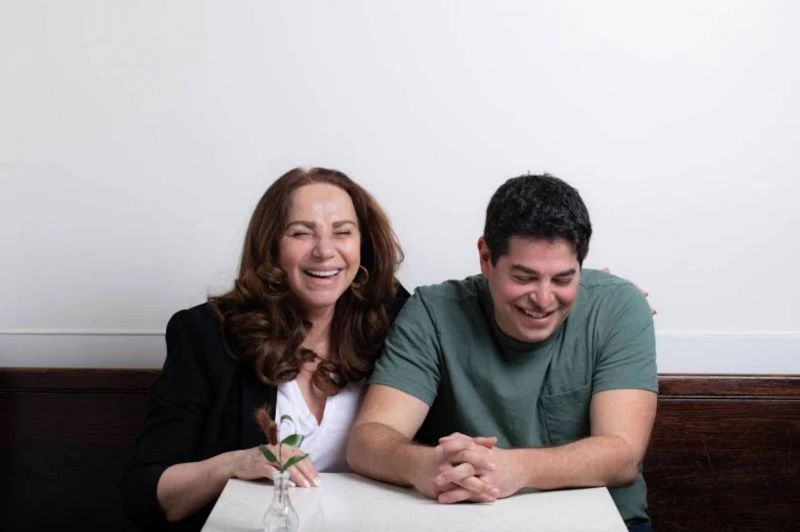
Beautiful complicity: Nabila and Michael Farah. (Photo: Michael Farah)
‘Nabila’s’ is on the corner of 248 Court St. Launched in May 2022, the restaurant is named after Michael Farah’s mother. Inspired by the dishes he grew up eating, the young man wanted to serve stuffed koussa, chicken with rice, shish barak and kibbeh to his Brooklyn clientele. It was a risky gamble, perhaps, but a success. The eatery has not been empty since it opened, and has been noticed by publications like The New York Times and Time Out, which ranks it on its list of 16 best new restaurants in NYC.
When asked about his story, Farah talks about his mother — her hospitality, the abundance of food, the flavor, the cooking. She taught him everything. But it was only in his forties, after a 15-year Wall Street career, that he decided to become a restaurateur.
His mother, the housewife
Nabila Farah was born and raised in Beirut. There she studied sociology at the American University of Beirut and met her future husband, an Egyptian architect who had been living in Lebanon since the 1960s.
The couple left war-torn Beirut at the end of the 1970s, moving first to Egypt, to Cyprus, then to California, where Michael was born. After six years in Riyadh, Saudi Arabia, the family finally settled in Washington, DC.
“All this time, Nabila was a stay-at-home mom,” her son recalled, “cooking delicious food for us.”. In Washington, Nabila and her husband socialized with expatriates and hosted big dinner parties. That’s where she sealed her reputation as a good cook.
When Michael Farah left home to study finance, his parents divorced. “It was a major event in my life and my brothers’ lives,” he said, “as well as in that of my mother who was financially dependent on my father.”
The split pushed Nabila Farah to start a business. She rented a small store in Virginia “with zero visibility” called The Gourmet Basket, a “silly name that she didn’t bother changing.”
She started preparing and selling and catering her home-cooking. That was a little over 20 years ago. She became known by word of mouth. Embassies and international organizations began to place orders with her. Her small business worked.
“Her dishes reminded the expatriate community of the dishes they used to have at home,” said Michael. “They couldn’t [find] it in a restaurant and that’s what made it work.”
Today, Nabila, almost 70, continues to work six days a week in a space that has doubled in size.
Wall Street burn-out
It was his mother’s successful career path that motivated her son to plunge into food. After working for 15 years in New York City investment funds, “in a very challenging and difficult environment,” he realized he was burnt out. In early 2018 he decided to throw in the towel.
“I was almost 40 years old, had two kids, and I was leaving everything to go into a sector that I had no experience in,” he recalls. “Some people thought I was crazy!”
Cautious by nature, Farah the younger had a dream. He wanted to open a restaurant in Cobble Hill, the neighborhood where he and his family had lived for the past few years, and introduce his mother’s cooking.
It took awhile. Starting in 2018, Farah made weekly trips to DC, to spend three days in his mother’s kitchens: observing, learning and writing down her recipes. In February, 2020, a month before the COVID-19 outbreak, he found a space in Brooklyn to locate his restaurant.
He hoped to have the restaurant up and running nine months later, but COVID-19 forced him to wait more than two years while renovations dragged on. ‘Nabila’s’ opened its doors in May 2022.
Shish barak and stuffed koussa
An unpretentious black-and-green façade represents Nabila’s. That’s what its owner wanted — “a simple and warm neighborhood restaurant, a bit like Nabila’s parties at home.”
Upon arrival, customers can see the daily dishes and order what they want before settling in. The menu includes essential mezze components — hummus, baba ghannouj, fatayer, kibbeh, tabbouleh, fattoush — but it’s the main courses that make all the difference. At Nabila’s, they don’t serve tawouk or kafta brochettes, but loubieh, shish barak, chicken with rice and stuffed koussa.
“The goal was to have a menu with Lebanese dishes that you can’t find in a restaurant, but that you eat at home,” he explained. The dessert features knafeh, the favorite dessert of Nabila’s customers, but atayef is also on hand.
Behind the ovens is chef Luis Ahuet. Mexican-born, with a Lebanese grandfather, he knows Lebanese gastronomy well. Before joining Nabila’s, he was a chef at a starred restaurant, but he spent a lot of time with Nabila to learn her dishes.
“It was a completely different experience for him,” Farah laughs. He was used to great chefs and culinary school, and all of a sudden, he was being taught everything by a Lebanese grandmother.”
Since its opening, Nabila’s has hosted a large and varied clientele. “When the Lebanese enter the restaurant, they are skeptical. I understand them and say, ‘Challenge accepted!’ They leave convinced.”
The skeptical Lebanese are not alone. This week The Times food critic Pete Wells included Nabila and Michael Farah’s fatayers among New York City’s Top seven Dishes of 2022.
This story was originally published in French in L’Orient-Le Jour, translated by Joelle Khoury